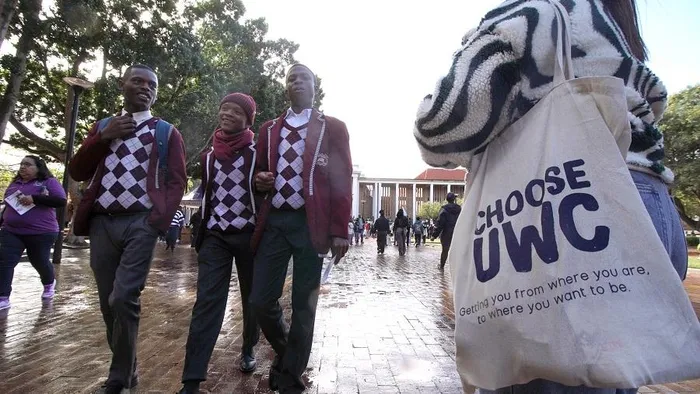'Most universities must be closed; they are not producing required skills'
Educational debate

Prospective students attended the UWC open day. Economist Dawie Roodt says that the university space should be reserved for those who can contribute to producing skills for society.
Image: Ian Landsberg / Independent Newspapers
Economist Dawie Roodt said this week that most public universities in South Africa should be closed because they are not producing the required skills.
He gave some examples, such as the need for electricians, and asserted that the humanities are at the bottom of the skills set production. While theology specifically was not mentioned by Roodt in his musings, the question of its place in a university always lingers.
For this reason, one is prone to respond, since this question has, in the past, been directed at the humanities — and theology in particular. A myriad of sentiments suggests, with reason, that theology is a science worth engaging with in the university. From the likes of F.C. Baur to Ernst Troeltsch, there has always been conversation on the role of theology and the humanities, particularly in the university.
For this reason, the argument advanced by Roodt is, sadly, not a new invention. The beginning of each century has seen renewed questions, and conversations have ensued around whether the humanities, as a science, have a place in the university. Thus, along every critical step in the evolution of the idea of a university, new questions have arisen, and all these have been met with corresponding responses.
Two scholars come to mind as I reflect on Roodt's views on a university. It is clear that, for Roodt, the university space should be reserved for those who can contribute to producing skills for society. Without justifying why other so-called humanities programs are irrelevant, Roodt seems to have no qualms with the idea of a university in Africa and what it initially came to represent. These two scholars are Ali Mazrui and Mahmood Mamdani.
Mazrui’s views on a university in Africa are well known, having described a university in Africa simply as a transmission belt for Western values.
For Mazrui, just as the African university has its genesis in European imperialism, so does the commercial multinational corporation. It must not be forgotten that the university in Africa had a particular purpose; in most cases, it served the very Europeans in the African diaspora.
Those Africans who were later allowed to be educated in these universities were trained to become competent in serving the needs of the Western folk in Africa. It was for this reason that, even when African personnel were appointed at these universities, the moderation of what was taught still needed to be done in London, Belgium, or Paris — and sometimes this moderation happened in horrifying ways, not recognising an education bespoke for Africans in Africa.
Mamdani is the other scholar that these reflections bring to mind. In a fascinating case study of market-based reforms at Uganda’s Makerere University between 1989 and 2005, Mahmood Mamdani discounted attempts at pitting private universities against public universities. He argued instead that a third way could be sound.
Mamdani assessed this because particular histories and lived experiences make up a university, particularly a university in Africa. Since scholars such as these have long engaged with attempts at transforming a university in Africa to reflect the lived experiences of Africans, we can sadly agree that the agenda to push for a university that considers the lived experiences of her people holistically is indeed a recent endeavour in South Africa, considering the impact that apartheid had on our psyche.
I am reminded of similar conversations a few years ago when I was chair of the Philosophy, Practical, and Systematic Theology department. This was when conversations on the relevance of philosophy — and maybe to a lesser extent, theology — for a university had become a poignant subject in the university SENATE meetings.
Many SENATE members at the time were unequivocal in their sentiment that unless we wanted to become a glorified business school, we were neglecting philosophy and theology to our detriment.
The financial meltdown of 2008 is one more example of when spirited opinions, devoid of the essence of the humanities, were entertained. While it is essential to produce skills that contribute to different skill sets, it is not helpful to discount other disciplines without properly understanding their purposes.
Adebayo Olukoshi, former Executive Secretary of the Council for the Development of Social Science Research in Africa, once indicated that the humanities are the conscience of society. If there were to be a yardstick to measure this, it would certainly not come in the form of money or the production thereof, but it would align with those left behind as others progress. It would then seem to me that the frustration, which is palpable in the voice of Roodt, is to be located elsewhere.
Perhaps it is becoming increasingly clear that with the numerous calls for the decolonisation of learning offerings, a university in Africa can no longer serve foreign interests at the expense of the locals. The decolonisation of learning offerings refers to re-evaluating and restructuring the curriculum and teaching methods to reflect the local community's diverse experiences and knowledge systems.
Perhaps the numerous calls made by African universities to serve the continent foremost, before serving the global community, are the issues that irritate Roodt and his ilk, because the questions for discourse today are no longer critical for the West and are no longer dominated by white folk.
Still, academia must intentionally allow the lived experiences of marginalised communities to frame these discourses.
Prof Rothney Tshaka Professor of Systematic Theology and Ethics UNISA